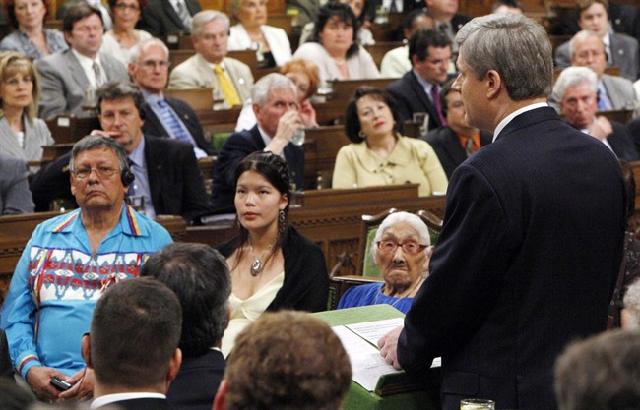Key Moments in the Struggle over First Nations Schooling Policy
Montreal Gazette
Education policy has long been a source of tension between the federal government and First Nations, from the painful legacy of residential schools to the current debate over the upcoming First Nation Education Act. Here are some key moments: 1874 The Canadian government's involvement in residential schools begins. Aboriginal children are removed from their communities across the country and placed in government-funded, church-run institutions. These schools are used to assimilate aboriginal children, by exposing them to new language and cultural traditions while stripping them of their own. 1972 The National Indian Brotherhood (which later becomes the Assembly of First Nations) asks for more control of its peoples' education. A policy is outlined in a paper called Indian Control of Indian Education. 1996 The last residential school closes in Yellowknife. The negative repercussions of life at these schools trickles down through generations of aboriginal peoples. 2004 Canada's auditor general finds that if current trends continue, it will take nearly 30 years for aboriginal people on reserves to obtain educational equality with the rest of the Canadian population. 2008 June 11: Prime Minister Stephen Harper offers an official apology, on behalf of Canada, to survivors of the residential school system. Along with the apology, the federal government establishes the Truth and Reconciliation Commission. The TRC is given a $60-million budget, and a five-year mandate to investigate and document this under-represented period in Canada's historical archives. 2010 June 9: AFN makes a call to action on First Nations education, inviting the entire country to participate in improving education on reserves. July 22: AFN releases "First Nations Control of First Nations Education 2010." AFN Chief Shawn Atleo asks that First Nations people be allowed to lead the way in improving their education. 2012 Jan. 24: A Crown-First Nations gathering is held. A commitment is made to "take action on education.” Dec. 11: Plans are announced for a First Nation Education Act. A discussion guide is published and released by the government, launching the first phase of the consultation process. 2013 May: After six months, phase one of the consultation process ends. June 11: On the five-year anniversary of Harper's residential-schools apology, AFN Chief Atleo expresses discontent with relations with the government. He has sent a letter to Harper citing areas that must be addressed if reconciliation is to be achieved. July 12: A letter is sent from the government to chiefs, updating them on the consultation process and outlining the next steps in preparing the First Nation Education Act. The government releases a "blueprint" of the proposed legislation, which opens the second consultation phase. The legislation is slated to be presented before Parliament this fall. The early outline of the bill proposes standards for "school-success plans" for each First Nation school; suggests following up with annual reports; and promises governance "options" for communities in accordance with treaty rights. 2014 September: The Canadian government hopes to implement the First Nations Education Act.
|
.
Any original material on these pages is copyright © BishopAccountability.org 2004. Reproduce freely with attribution.
